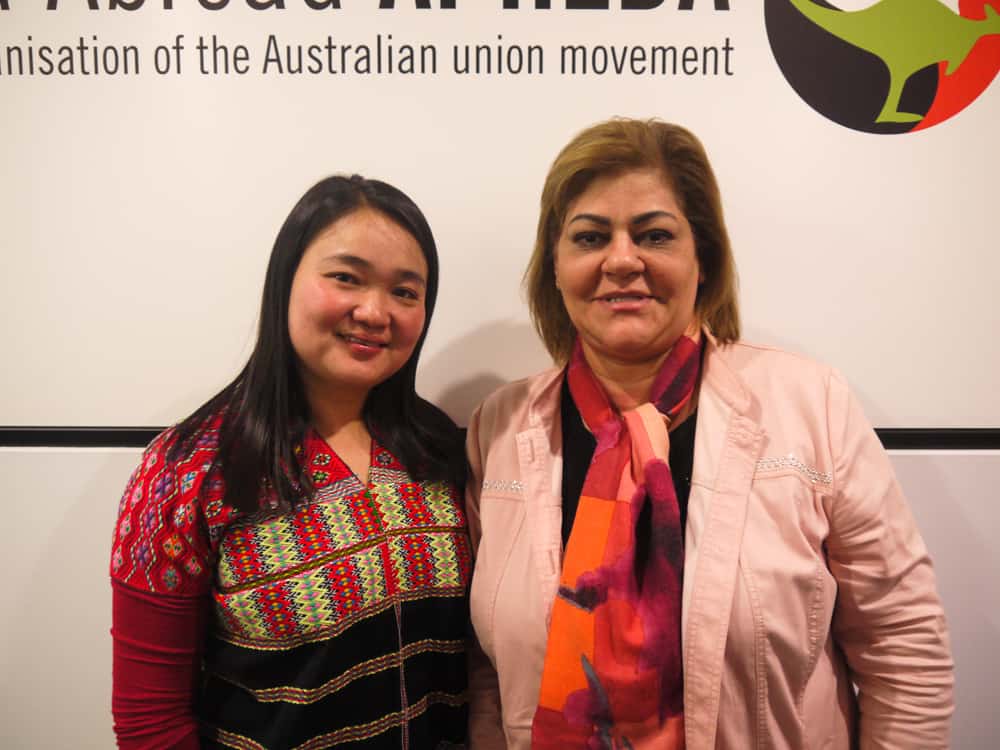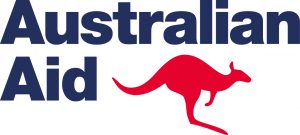Five Challenges that Refugee Women are Overcoming through Collective Power
By coming together to build grass-roots organisations, refugee women are overcoming challenges to secure their livelihoods, their education, their healthcare, and their independence. Union Aid Abroad – APHEDA was privileged to host Olfat Mahmoud and Naw K’nyaw Paw in conversation about how their grass-roots organisations are helping women build collective power in their communities.

Dr Olfat Mahmoud is the founder and director of the Palestinian Women’s Humanitarian Organisation (PWHO), a long-time Union Aid Abroad – APHEDA partner organisation that helps refugee women secure their independence.
Naw K’nyaw Paw is the General Secretary of the Karen Women’s Organisation (KWO), a 60,000-strong movement of women in the refugee camps of the Thai-Myanmar border that helps young refugee women become leaders and advocates in their communities.
Here, we look at five ways that that refugee women are overcoming challenges through collective action.
1) Eliminating prejudice against women
Olfat tells us that in refugee communities, “many women look at themselves as caregivers, full-stop. They will tell us what their family needs, but they don’t tell us what they themselves need.” K’nyaw Paw identifies similar issues in the camps of the Thai-Myanmar borders, saying: “women are expected to care for the families and they are excluded from decision-making. If they do get jobs, they get the lower-paid caring jobs.”
But by developing their leadership skills, by building their professional capacities, and by working on their education, refugee women are better positioned to stand up against prejudiced attitudes and make their own decisions in their personal, family, and professional life.
We, the Karen Women's Organization (KWO) strongly believe that a sustainable peace process cannot be achieved in Karen…
Posted by Karen Women's Organization – KWO on Wednesday, 28 August 2019
2) Helping women become financially independent
The importance of vocational training in refugee communities is essential in securing the financial independence of refugee women, whose education opportunities are often restricted.
But by helping refugee women access training programs, internships, voluntary positions, professional workshops, online learning spaces, and training refreshers, women’s organisations like the PWHO and the KWO are supporting women achieve financial independence.
Olfat tells us the story of one woman in the PWHO, who told her:
“Without my work, I wouldn’t be able to send my daughter to university. I build up my personality. It’s not only financial, but I am another person. Now in my community I can talk about different topics, if I’m not working I would never have heard about these topics”
3) Demanding equality
In communities of internally-displaced people in Myanmar, and in refugee communities along the Thai-Myanmar border, the Karen Women’s Organisation is giving voice to local women by securing them places at the decision-making tables of villages and refugee camps.
This has meant that in the Karen State of Myanmar, major legislative changes have been achieved through the collective campaigning of the Karen Women’s Organisation. Today, Karen women in Myanmar must be eighteen years old before they marry, up from just fifteen years of age only a few years ago. Karen women have also secured more protective legal definitions of rape, and they have successfully improved the terms of punishment and compensation in cases of abuse and rape.
Karen Women’s Org (KWO) supports 700+ children with disabilities in 11 Special Education Centers in the refugee camps & over 50 villages in Karen State in Burma. Naw K’nyaw Paw is an Indigenous leader & a feminist ! @unionaidabroad
Posted by Cindy Louise O'Connor on Thursday, 29 August 2019
4) Supporting women’s careers
By employing local women in their own communities to work as health workers, administrative officers, trainers, carers, and community workers, grass-roots organisations like the PWHO and the KWO are providing opportunities for refugee women to pursue professional careers.
Over sixty refugee women work for the PWHO, where they find rare opportunities to develop their professional skills. “They become independent”, Olfat tells us, “and they develop their personalities.” One of those PWHO women told Olfat:
“I joined the PWHO as one person, now I am another person. All my skills were developed.”
K’Nyaw Paw tells us of how the women participants in the KWO Leadership School are encouraged to develop long-term plans for their career, and to commit to civic participation. Following their year of training, they are welcomed to to continue campaigning through the KWO “to support their communities, and to stand on your own feet.”
K’Nyaw Paw tells us that she is proud to hear local village members say:
“If you want strong daughters, send them to the KWO.”
5) Securing justice for women
Through advocacy, education, and through campaigning, refugee women are working to prevent domestic abuse. In Lebanon, though refugee women are not recognised as citizens, they are engaging with international NGOs and raising awareness within their own communities on the risks of early marriage.
In the Karen State of Myanmar, displaced women have had significant success in addressing these issues through regional legislatures, securing a higher age of consent, more protective legal definitions of rape, and more just terms of punishment and compensation in cases of abuse and rape.
At the end of their conversation, Olfat and K’nyaw Paw recognised that although there are great differences between the cultures and histories of their homelands, refugee women share similar challenges and solutions. “We are from different parts of the world, buy we have many similarities,” Olfat reflects.
Union Aid Abroad supports the Capacity Building for Karen Women Project and the Palestinian Women’s Health Organisation in partnership with the Australian Government through the Australian NGO Cooperation Program (ANCP).

"By standing together across borders, we can make a better world"
Union Aid Abroad – APHEDA works in partnership with the Karen Women’s Organisation (KWO) and the Palestinian Women’s Health Organisation (PWHO) to help women develop the skills and knowledge they need to defend their rights. Show your solidarity with refugee women by becoming a member of Union Aid Abroad – APHEDA!
